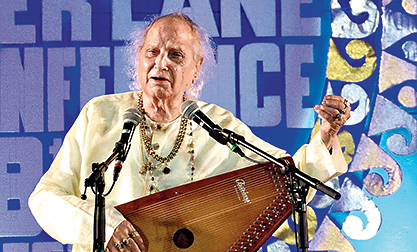The Dover Lane Music Conference of 2020 can be referred to as a colourful Twenty20 series of Indian classical music on the basis of artist combination and overall arrangement. The programme was dedicated to the centenary of Ravi Shankar; the Sangeet Samman was given to Aashish Khan. The four-night-long series began with Saswati Bagchi’s vocal recital with Raga Jog. Stree Shakti under the direction of Anuradha Pal on the tabla evoked expectations from the sitarist, Mita Nag, and Revathi Sadasivam on the veena. The all-women ensemble was well-supported by Ramya Ramesh (ghatam) and R. Krishnapriya (kanjira). They started with Maha Ganapatim in Natai followed by Malkaus or Hindolam (in Carnatic) and a ragmala of morning to late-night ragas.
M. Venkatesh Kumar presented Maru Behag with ecstasy, followed by an arresting Jayjayanti with the able tabla accompaniment of Samar Saha. The ambience was well maintained by the sitar and sarod duet of Mor Mukut Kedia and Manoj Kumar Kedia in Chandranandan. The Carnatic vocals of Bombay Jayashri involved soulful kritis composed by Thyagaraja. The singer seemed down on her next renditions like Parvathi Nayakam but found her forte in tillana.
The disappointing Charukeshi on the mohan veena by Vishwamohan Bhatt and the satwik veena by Salil V. Bhatt decreased the musicality of the first innings. On the second day the series got a boost with Uday Bhawalkar’s beautiful voice. He rendered dhrupad in Yaman with a long alaap followed by a compact composition in Tilang. The flute of Hariprasad Chaurasia with the tabla of Subhankar Banerjee was a great combination. The happiness continued with a wonderful vocal recital by Manjiri Asanare Kelkar, who began with Kafi Kanada. There was an energetic double violin performance by L. Shankar. The rendition in Carnatic beats with the perfect combination of Abhijit Banerjee (tabla) and Sai Hari (ghatam) was greatly enjoyable. But the upward curve of the innings went down due to a reluctant vocal performance by Kaivalyakumar Gurav.
The third night started with Arati Ankalikar, whose Maru Behag could have been more melodious. The well coordinated performance by Kumaresh Rajagopalan on violin and Jayanthi Kumaresh on saraswati veena was enchanting. Ashwini Bhide Deshpande, with her exceptional voice, presented Raga Khem Kalyan with the compositions of Alladiya Khan from the Jaipur Atrauli gharana. Shujaat Hussain Khan played Sampoorna Malkaus with a beautiful alaap. Ajoy Chakraborty’s unusual rendition of Ahir Lalit and a charming bhairavi showed that more was to come in the finale.
The opening partnership of Bhajan Sopori and Abhay Rustum Sopori was not very stable although they made an honest effort with Bageshree and Kausi Kanada. Expectations went higher when Rashid Khan took the stage and began a vilambit kheyal in Jogkauns. But he lost his mood due to some disturbances and, despite a very good beginning in drut kheyal, he ended abruptly. The Vasanth was brief and beautiful, followed by thumri. The audience enjoyed Rhythm Quartet mainly for Vikku Vinayakram (ghatam) and some rhythmic movements with the kanjira by Selvaganeshan and V. Swaminathan and the morsing by Umashankar Ganeshan. But the final innings found its magic with Amaan Ali Khan’s sarod. He played the aochar of Nandakosh, an invention of Suresh Chandra Chakraborty evolved by Chinmoy Lahiri. Amaan’s expertise in infusing both brain and heart in his playing style was reflected in the rendition of vilambit gat. The innovation of the tihais and complicated taans showed his depth in vilambit and drut gats with Vijay Ghate’s perfect accompaniment. He played an absorbing Miyan ki Todi alaap followed by an intense jor and jhala.
The musical thread he left on the stage was touched with great care by Pandit Jasraj. The grandeur of his rendition in Charukeshi and Todi followed by his famous bhajans like Bhagavate Vasudevay enthralled listeners. His splendour at the age of 90 proved that an artist’s last word is art. With this, the Dover Lane Musical Series 2020 won at the finale.










